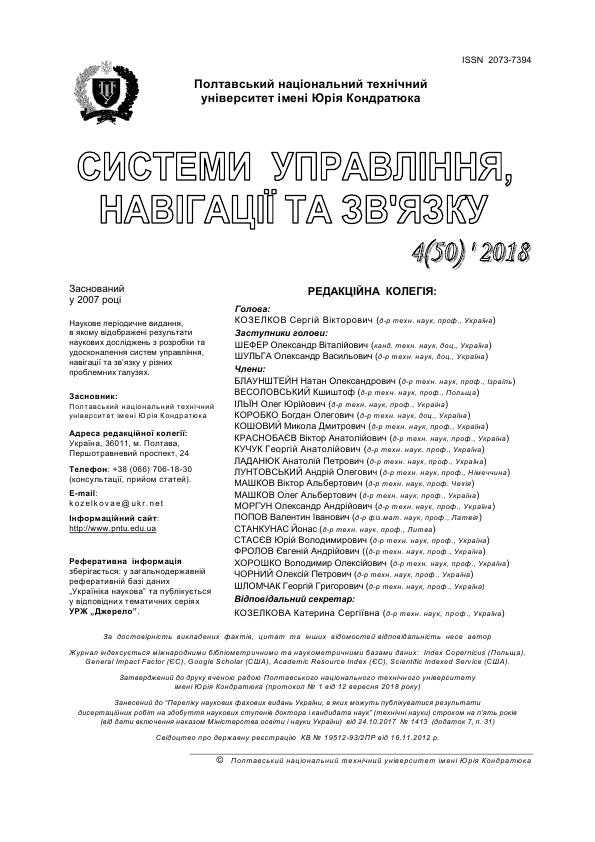DEVELOPMENT OF SCRIPT LANGUAGE FOR NOTATION RULES IN EXPERT SYSTEM BASED ON FUZZY LOGIC
DOI:
https://doi.org/10.26906/SUNZ.2018.4.152Keywords:
system, script language, fuzzy logic, intellectual system, production model of knowledge representationAbstract
The subject matter is the process of developing expert systems using the apparatus of fuzzy logic and product knowledge base. The goal is to develop a scripting language for writing rules into the knowledge base of an expert system using fuzzy logic. A scripting language that implements the minimal possibilities for describing rules, namely: the description of variables writing and processing of logical expressions; definition of namespaces. That would allow: more accurately describe a specific situation; provide more flexible means of description; perform logical operations between different types of data; compensate the ambiguity of the conclusions of experts, considering the possible unreliability of the data. The tasks to be solved are: to explore existing, distributed scripting languages, languages that are used to notate the rules into the knowledge base of the expert system, to analyze the existing methods of their application. Develop own language for notating the rules. The language of logical programming, interpreted, integrated into the mechanisms of the ES, but one that can be separated into an independent one. The following results were obtained: the script language has been developed to notate rules into the knowledge base of the expert system using the fuzzy logic apparatus. The scripting language implements the minimal possibilities for describing rules: the description of variables writing and processing of logical expressions; definition of namespaces. That allows more accurately to describe a certain situation; provide more flexible means of description; perform logical operations between different types of data; to compensate the uncertainty of the expert's conclusions, considering the possible unreliability of the data. Directions for further research and work on improving and expanding the scope of the developed scripting language are determined. Conclusions. A script language has been developed to notate rules into the knowledge base of the expert system based on the fuzzy logic apparatus. At the moment, the developed scripting language implements the minimal possibilities for the description of rules: the description of variables writing and processing of logical expressions; definition of namespaces. This allows more accurate description of a specific situation; provide more flexible means of description; perform logical operations between different types of data; to compensate the ambiguity of the experts' conclusions, considering the possible unreliability of the data. It is planned to implement support for constructs that will allow using the scripting language separately from the expert system.Downloads
References
Ecma International. ECMA- 262 / Ecma International. – Geneva: Ecma International, 2018. – 805 с. – (Ecma International).
Vahid R. A Novel Web-based Human Advisor Fuzzy Expert System / R. Vahid, H. Mahdi. // Journal of Applied Research and Technology. – 2013. – №11. – С. 161–168.
George J. M. SeTES, a Self - Teaching Expert System for the analysis, design and prediction of gas production from unconventional resources / J. Moridis George. // RPSEA. – 2011. – №712. – С. 1–116.
The Making of Python [Електронний ресурс] // Artima. – 2003. – Режим доступу до ресурсу: https://www.artima.com/intv/pythonP.html.
Andressa6 S. N. Accident diagnosis system based on real-time decision tree expert system / S. N. Andressa, P. A. João, S. Roberto. // American Institute of Physics. – 2017. – С. 1–6.
Ivan B. Prolog Programing for Artificial Intelegence / Bratko Ivan. – Harlow: Pearson education limited, 2012. – 697 с. – (Pearson). – (4; кн. 4).
Eronen P. An expert system for analyzing firewall rules / P. Eronen, J. Zitting. // Helsinki University of Technology. – 2001. – С. 1–8.
Pascual J. Bousi Prolog: a Prolog Extension Language for Flexible Query Answering / J. Pascual, R. Clemente, J. Gallardo-Casero. // Electronic Notes in Theoretical Computer Science. – 2009. – №248. – С. 131–147.
S. Escobar (Ed.): XIV Jornadas sobre Programaci ́on y Lenguajes, PROLE 2014, Revised Selected Papers EPTCS 173, 2015, pp. 71–86, doi:10.4204/EPTCS.173.6 A Fuzzy Logic Programming Environment for Managing Similarity and Truth Degrees / J.Pascual, M. Gin ́es, P. Jaime, V. Carlos. // ornadas sobre Programaci ́on y Lenguajes. – 2015. – С. 71–86.
Хох В.Д. Експертна система для автоматизації аудиту інформаційної безпеки комп’ютерних систем та мереж / В.Д. Хох, Є.В. Мелешко // Збірник тез Шостої міжнародної науково-технічної конференції "ITSEC", м. Київ, 17-19 травня 2016. – Київ: Національний авіаційний університет. – 2016. – С. 17-18.
Хох В.Д. Дослідження методів побудови експертних систем / В.Д. Хох, Є.В. Мелешко, М.С. Якименко // Збірник наукових праць "Системи управління, навігації та зв’язку". Випуск 4(40). – Полтава: ПНТУ ім. Ю. Кондратюка. – 2016. – С. 48-52.
Болотова І. С. Системы искуственного интелекта: модели и технологии, основанные на знаниях / І. С. Болотова. – Москва: Финансы и Статистика, 2012. – 664 с. – (ФГАУ ГНИИ ИТТ "Информатика").
AN OVERVIEW OF PENETRATION TESTING / G. B.Aileen, Y. Xiaohong, B. C. Bei-Tseng, J. Monique. // International Journal of Network Security & Its Applications (IJNSA),. – 2011. – №6. – С. 19–38.
Technical Guide to Information Security Testing and Assessment / S.Karen, S. Murugiah, C. Amanda, O. Angela. // National Institute of Standards and Technology. – 2008. – С. 24–34.




